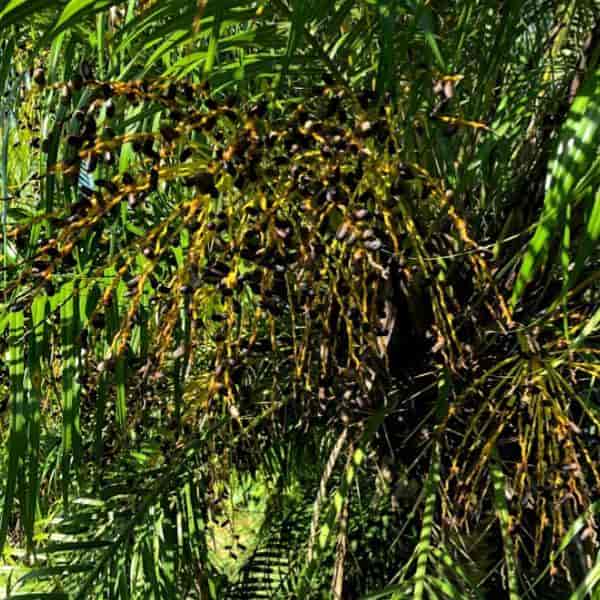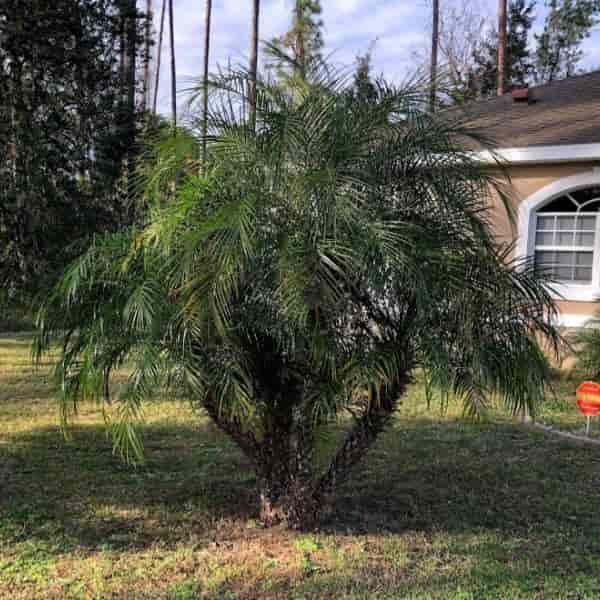Phoenix roebelenii (botanical name) [roh-bel-EN-ee-eye] is also known as the dwarf Pygmy Date palm.
The plant is also often referred to as Robellini palm [roh-bel-EN-ee].

Pygmy Date Palm Quick Care Tips
- Botanical Name: Phoenix Roebelenii
- Common Name(s): Pygmy Date Palm, Miniature Date Palm
- Synonyms: Phoenix hanceana, Phoenix loureirii var. humilis
- Family & Origin: Arecaceae family, native to Southeast Asia
- Growability: Easy to grow
- Grow Zone: 9-11
- Size: Grows up to 8-10′ feet tall but usually stays around 5′ feet when grown indoors
- Flowering: Small yellow flowers in the spring
- Light: Bright, indirect light
- Humidity: Prefers high humidity but can tolerate lower levels
- Temperature: Thrives in warm temperatures, between 50-75°F
- Soil: Well-draining soil
- Water: Water regularly, keeping the soil moist but not waterlogged
- Fertilizer: Fertilize every 2-3 months with a balanced fertilizer
- Pests & Diseases: Susceptible to spider mites, mealybugs, and scale insects. Can also be affected by fungal diseases if overwatered.
- Propagation: Propagated by seed or by division of offshoots
- Plant Uses: Makes a great indoor or outdoor plant and adds tropical flair to any space. Can also be used as a privacy screen or as a focal point in a garden.
The small pygmy date palm hails from the understory of the dense forests of southeast Asia and Africa and belongs to the family Arecaceae, which is the palm family.
Pygmy Date Palm Care
Size & Growth
The pygmy date palm growth rate is slow, and mature plants will attain a height of no more than 5’ feet when grown indoors.
Outdoors, these landscape palms can reach 8′ – 10′ feet tall.

The plant’s foliage consists of graceful, arching fronds about 3’ feet long with slim, delicate leaves.
Another date palm to consider –> Phoenix canariensis – Canary Date Palm
Flowering & Fragrance
When grown outdoors, these dioecious plants produce distinctive male and female flowers on separate trees.
The cream-colored flowers mature into edible dates on female trees.
Phoenix Roebelenii Care: Light & Temperature
As a forest understory plant, the pygmy date palm robelenii does very well outdoors in a setting with bright, indirect sunlight or partial shade but will tolerate some full sun.
These plants do very well when placed near a south or east-facing window.
Roebelenii palm does well with medium-filtered light, but you must take care not to water excessively in a lower light setting.
These dwarf date palm plants grow best at temperatures ranging from 50° – 75° degrees Fahrenheit (10° C – 24° C).
Avoid allowing the temperature to drop below 50° degrees Fahrenheit (10° C).
Pygmy Date palms are winter hardy in the United States hardiness zone 9b – 11 (USDA Zone).

Watering and Pygmy Date Palm Fertilizer
As tropical understory plants, these small date palms will not thrive without moderate or high humidity levels.
Throughout the growing zone season, spring through autumn, keep your Pygmy Date Palm well-watered.
As with most plants, avoid leaving the soil soggy.
The plant should never be left standing in water. When planting in a pot, always use a pot with drainage holes.
During the winter months, reduce watering. Allow the soil to dry out completely in between waterings.
Early in the springtime, resume regular watering and give your Pigmy date palm a half-strength dose of time-release fertilizer.
It will appreciate another dose ofpalm fertilizer in mid-summer.
The best type of fertilizer to use for these small palm trees is palm tree fertilizer, which is formulated to contain the right micronutrients for this particular type of palm.
Plant food without enough magnesium or a potassium deficiency will cause the leaves to develop yellowing spots.
It’s best to fertilize the Pigmy palms twice a year using a time-release plant food.
If you are not able to use a time-released formulation, fertilize once a month with a liquid plant fertilizer at half-strength during the plant’s growing season.
Related: Learn About the Edible Date Palm
Roebelenii Palm Care: Soil & Transplanting
Always use a well-draining potting mix with a bit of coarse sand or perlite added to provide the right nutrients and good drainage.
The best time to repot Phoenix roebelenii is in the springtime, just before the growing season.

You must repot very carefully because the plants have quite delicate roots, and the root ball does not take well to disturbance.
When the Dwarf pygmy palm has fully matured and is not expected to grow any larger, avoid repotting altogether.
Instead, turn and dig away the top several inches of soil and replace it with a fresh, top dressing of nutrient-rich potting soil once a year in the early spring.
When choosing a container for your Dwarf Palm tree, avoid lightweight plastic choices.
Instead, go for a heavier terra-cotta or ceramic container to prevent toppling.
Put a layer of gravel in the bottom for added ballast.
Pygmy Palm Tree Grooming & Maintenance
- Roebelenii is fairly low-maintenance.
- Prune away dead or damaged fronds as needed.
- Be careful when coming into contact with the sharp spines found at the base of each leaflet.
- It is always wise to wear protective gloves when handling Pigmy date palms.
You may also like the Windmill Palm – Trachycarpus fortunei
How To Propagate Pygmy Date Palm Tree
When you repot dwarf date palms, you may find it has been potted with additional plants that look like suckers at the base of the plant.
To propagate new pygmy palms, start them from seed and plant them in small pots.

Phoenix Pygmy Palm Trees Pest or Disease Problems
For the most part, these hardy little date palms are resistant to disease. However, when kept outdoors and planted directly in the soil, they may fall prey to soil-borne fungal diseases causing root and trunk rot.
With most palm varieties being single trunk, it’s a tough disease to combat.
Excessive watering will cause root rot.
If you overwater your dwarf palm plant, you may also find the leaves begin to turn brown.
This may also be problematic if you live in an area with hard water.
When grown outdoors, the young, tender leaves of the pygmy date tree may attract:
- Caterpillars
- Weevils
- Plant scale
- Mealybugs
- Spider mites
… early in the growing season.
Is pygmy date palm poisonous or Toxic?
Pygmy date palm trees are not poisonous, and in ideal settings, they produce edible dates.
These dwarf Palms are said to be very good clean-air plants and are reported to excel at removing carbon monoxide, formaldehyde, benzene, and xylene from the air.
Is The Phoenix Pygmy Date Palm Invasive?
While Phoenix roebelenii palm trees can grow well outdoors in semitropical US settings and self-propagate readily, they are not considered invasive.
Suggested Uses For Pygmy Date Palm Trees
In tropical and semi-tropical settings, pygmy date palms may be planted outdoors year-round in small clusters.

They are very popular landscape plants throughout the state of Florida, but they should not be planted at the seaside as they do not tolerate salt spray.
In cooler climates, the pygmy date palm makes excellent large indoor houseplants.
Their origins make them ideal candidates for pool landscaping, on a deck, and entryways, along with home, office, and commercial settings.